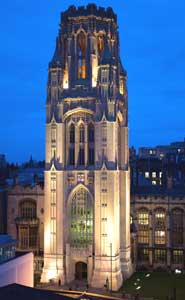Bristol is among the UK’s top research universities, according to a rigorous exercise to assess the quality of research at every university. The exercise will decide how more than £1.5 billion in research funding will be allocated each year from 2009-10.
Over 61 per cent of the research work assessed in 48 research fields at Bristol has been awarded either the top 4* rating, defined as ‘world leading’, or the 3* rating, classed as ‘internationally excellent’. The quality of Bristol's research in geography has emerged as first equal with Cambridge in the UK.
Epidemiology and public health, health services research, chemistry, mathematics, drama, mechanical engineering, economics, accounting and finance, aeronautical engineering and sports-related studies are among other research areas in which the University has achieved particular distinction.
Bristol’s faculties of Science and Engineering have performed exceptionally well, but there are areas of outstanding research performance across all six faculties.
Taking into account the 2* rating – defined as ‘recognised internationally’ – as well as the 3* and 4* ones, nearly 93 per cent of research at Bristol has been deemed to be of international standard.
Over 90 per cent of eligible staff at Bristol were included in the University’s Research Assessment Exercise (RAE) submission – thought to be one of the highest percentages in the sector.
Professor Eric Thomas, Bristol University’s Vice-Chancellor, said: “These results confirm that Bristol is producing an exceptional volume of truly outstanding research. Our established areas of excellence have continued to perform at the highest levels, and new areas are establishing themselves as world leading or internationally excellent.
“Research conducted here is making a real difference not only to the sum of human knowledge but also to the overall well-being of mankind. We’ll have to wait until the spring to find out how much HEFCE [the Higher Education Funding Council for England] will give us each year to help us maintain and extend such vital work.”
Professor Thomas cited recent examples of research at the University that is having or will have a positive impact, from work on increasing crop yields to preventing blocked arteries, and from welfare reform to human tissue engineering.
The RAE is an independent assessment of the quality of research in UK universities, carried out on behalf of the higher education funding bodies. Panels of experts produce a quality profile for each area of research within a university. The profile determines how much quality-related funding each research area will receive.
The last RAE was in 2001 and led to Bristol University receiving more than £40 million a year in quality-related research funding from HEFCE. The University will not know until March 2009 how much it will get as a result of RAE 2008.
The RAE’s significance goes beyond money: the results also give potential students and staff an insight into the quality of UK universities and help guide investment decisions by industry, charities and other organisations that sponsor research.
Summary information about Bristol University’s RAE 2008 results is available at www.bristol.ac.uk/rae.
Further information about the national RAE 2008 results is available at www.rae.ac.uk.
Time magazine’s Top Ten Medical Breakthroughs and Scientific Discoveries of 2008 includes no fewer than four projects in which Bristol University is closely involved.
Bristol University has 31 Fellows of the Royal Society and nine Fellows of the British Academy on its active and emeritus staff. That is impressive by any standards; in relation to the University’s modest size, it is remarkable.
The Bristol Laboratory for Advanced Dynamics Engineering (BLADE), which opened at the University in 2005, is the most advanced of its kind in Europe.
The Children of the ’90s study has followed the health and development of 14,000 children, making it one of the most comprehensive studies of pregnancy, infancy and childhood ever undertaken.
